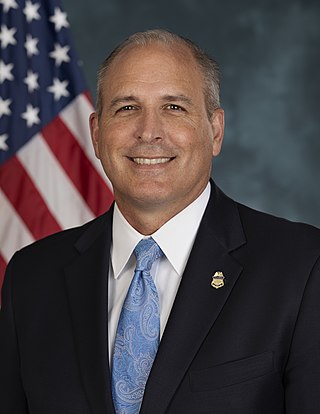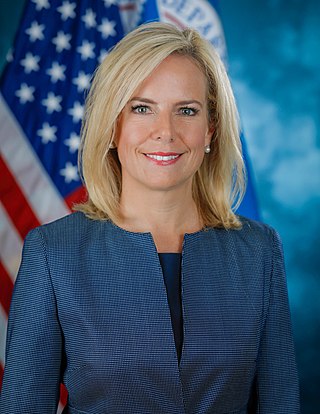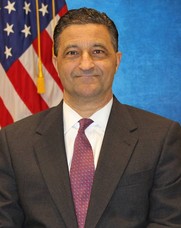
Brian Murphy was the acting United States Under Secretary of Homeland Security for Intelligence and Analysis from March 2018 until July 31, 2020. [1] [2] [3]

Brian Murphy was the acting United States Under Secretary of Homeland Security for Intelligence and Analysis from March 2018 until July 31, 2020. [1] [2] [3]
He earned a Bachelor of Arts in Government from the College of William & Mary, and a Master’s degree in Islamic studies from Columbia University. [1] He is currently a doctoral student at Georgetown University. [4] He served in the U.S. Marine Corps from 1994 to 1998 as an infantry officer. Murphy began his FBI career in 1998 and worked there for 20 years, culminating in a position responsible for the FBI’s national level counterterrorism programs. As a junior special agent assigned to the FBI's New York Field Office his work in counterterrorism were noted in an Esquire article called Brian Murphy V. The Bad Guys [5] Murphy was also a leading counterterrorism investigator who focused on illicit financing. He led an FBI investigation called Blackbear. The Blackbear illicit counterterrorism case was among the first of its kind in the post 9-11 environment. [6]
Murphy took a leave of absence from the FBI and was called back to active duty as a Marine Officer. As an infantry officer, Murphy served with a Marine reserve infantry battalion 2/24 in Iraq in 2004. [7] He later moved to DHS as the Principal Deputy for Intelligence and Analysis, and in May 2020 became Acting Under Secretary for the Office of Intelligence and Analysis. [1] He was temporarily reassigned from that position two months later after it was alleged his office had compiled dossiers of public information about journalists who were reporting on the George Floyd protests. [8]
Murphy has appeared as an expert witness on both international and domestic terrorism. [9] [10] [11]
Murphy filed a whistleblower complaint [12] in September 2020 alleging episodes of misconduct by top DHS officials. Murphy asserted that DHS secretary Chad Wolf and his deputy Ken Cuccinelli instructed him “to modify intelligence assessments to ensure they matched up with the public comments by President Trump on the subject of ANTIFA and 'anarchist' groups” and to downplay the threat posed by white supremacists. Murphy stated he declined to comply. Murphy also claimed Wolf told him to "cease providing intelligence assessments on the threat of Russian interference in the US, and instead start reporting on interference activities by China and Iran.” Murphy said Wolf told him this directive came from White House national security advisor Robert O'Brien. [13] [14]
He had also submitted prior complaints. In early 2020, he had submitted six internal complaints to the Office of the Director of National Intelligence about the way the intelligence program was addressing Russian disinformation. He had also filed two Office of the Inspector General reports about “attempted censorship of intelligence analysis.” [15]
Days before his September 2020 complaint, ABC News reported that DHS under Trump 2020 had withheld the July release of an intelligence bulletin to law enforcement that warned of Russian efforts to promote “allegations about the poor mental health” of Joe Biden. DHS chief of staff John Gountanis halted the release pending review by secretary Wolf. The bulletin stated that analysts had “high confidence” of the Russian efforts, which were similar to efforts by Trump and his campaign to depict Biden as mentally unfit. A DHS spokesperson said the bulletin was “delayed” because it did not meet the department’s standards. The bulletin had not been released as of the date of the ABC News report. Murphy asserted in his complaint that Wolf told him “the intelligence notification should be ‘held’ because it ‘made the President look bad.’” [16] [17] Murphy alleged that Kirstjen Nielsen had politicized DHS. [18] [19]
Much of what Murphy alleged in his complaint has been proven accurate by press accounts or reports issued by other government agencies. For example, Murphy claims about reporting on China and Iran over Russian interference was articulated in the March 2021 Office of Director of National Intelligence's Election 2020 Intelligence Community Assessment. [20] [21]
On Juneteenth 2020, the "BlueLeaks" hack revealed a lack of information about right wing groups and Russian interference in the United States. [22] [23]
Murphy also alleged the threat from right wing domestic extremists was substantial, but he received pressure not to reveal the results. [24] [25] On January 6, 2021 the Capitol was overrun by extremists who were part of a right wing mob. Many reporters noted Murphy's intelligence predictions and the January 6 incident. [26] [27] [28] [29] [30]
In July, 2021 it was revealed the DHS Inspector General's Office had interfered in the investigation into Murphy's claims. And independent watch dog, the Project On Government Oversight, revealed in a seven page report that the DHS Inspector General, Joseph V. Cuffari, manipulated the investigation in an effort to disrupt the investigation into Murphy's claims. The report states Murphy was cleared in January 2021 of any wrong doing by the rank and file IG staff, however, the Inspector General blocked the release of the conclusions. The report and a NY Times article further explain the improper interference was conducted for political purposes. The Inspector General and other senior staff at the IG's office attempted to protect Wolf and Cuccinelli from being investigated. The article indicates the whistleblower allegations related to Russia and White Supremacy were among the causes for the improper intervention. Both articles state if Murphy had not been wrongfully removed in September 2020 there is evidence DHS would have been in a position to detect the insurrection at the U.S. Capitol on January 6, 2021. [31] [32] [33]
According to the Wall Street Journal, Murphy had asked for substantial resource enhancements in 2019 and early 2020 to combat a growing disinformation threat from Russia and an emerging White Supremacy threat. His requests were denied by Wolf and Cuccinelli. [34] In August 2021 it was reported by the press that once Murphy was removed in July 2020 he was replaced by an inexperienced partisan employee, Joseph Maher. Maher shut-down all of the organizations ability to detect domestic terrorism threats. The reports suggest this led to the intelligence failures at DHS to identify violent online rhetoric in the lead up to the January 6th, 2021 attack on the U.S. Capitol. Maher was reported by the New York Times to have potentially retaliated against Murphy after Murphy filed his Whistleblower complaint. [35] [36] According to a DHS intelligence document produced under the Freedom of Information Act, shortly after Wolf removed Murphy, Maher restricted the ability of DHS to collect pertinent intelligence about Russian interference and White Supremacy. [37]
Mark S. Zaid is an American attorney, based in Washington, D.C., with a practice focused on national security law, freedom of speech constitutional claims, and government accountability.

Kenneth Thomas Cuccinelli II is an American lawyer and politician who served as the senior official performing the duties of the Deputy Secretary of Homeland Security from 2019 to 2021. A member of the Republican Party, he also served as the Principal Deputy and Senior Official Performing the Duties of the Director of U.S. Citizenship and Immigration Services (USCIS) and was Attorney General of Virginia from 2010 to 2014.

Mark A. Morgan is an American law enforcement official who served as the Chief Operating Officer and acting Commissioner of U.S. Customs and Border Protection from July 5, 2019, to January 20, 2021.

Chad Fredrick Wolf is a former lobbyist and former American government official who was named the acting United States secretary of homeland security in November 2019. His appointment was ruled unlawful in November 2020. Wolf was also the under secretary of homeland security for strategy, policy, and plans from 2019 to 2021.
Elizabeth Neumann is an American former homeland security official. In the Trump administration she served from February 2017 to April 2020 as a senior advisor and Deputy Chief of Staff of the Department of Homeland Security (DHS) to DHS Secretary John Kelly and Acting DHS Secretary Elaine Duke, and as DHS Assistant Secretary for Threat Prevention and Security Policy to DHS Secretary Kirstjen Nielsen, Acting DHS Secretary Kevin McAleenan, and Acting DHS Secretary Chad Wolf. She served on the Homeland Security Council staff in the George W. Bush administration starting in 2003.

Kirstjen Michele Nielsen is an American attorney who served as United States Secretary of Homeland Security from 2017 to 2019. She is a former principal White House deputy chief of staff to President Donald Trump, and was chief of staff to John F. Kelly during his tenure as Secretary of Homeland Security.

Michael Kevin Atkinson is an American attorney. He worked for the United States Department of Justice for approximately 15 years, before becoming the second Inspector General of the Intelligence Community. He assumed office on May 17, 2018.

Russian interference in the 2020 United States elections was a matter of concern at the highest level of national security within the United States government, in addition to the computer and social media industries. In 2020, the RAND Corporation was one of the first to release research describing Russia's playbook for interfering in U.S. elections, developed machine-learning tools to detect the interference, and tested strategies to counter Russian interference. In February and August 2020, United States Intelligence Community (USIC) experts warned members of Congress that Russia was interfering in the 2020 presidential election in then-President Donald Trump's favor. USIC analysis released by the Office of the Director of National Intelligence (DNI) in March 2021 found that proxies of Russian intelligence promoted and laundered misleading or unsubstantiated narratives about Joe Biden "to US media organizations, US officials, and prominent US individuals, including some close to former President Trump and his administration." The New York Times reported in May 2021 that federal investigators in Brooklyn began a criminal investigation late in the Trump administration into possible efforts by several current and former Ukrainian officials to spread unsubstantiated allegations about corruption by Joe Biden, including whether they had used Trump personal attorney Rudy Giuliani as a channel.
Zolan Kanno-Youngs is an American journalist based in Washington, D.C. who is a White House correspondent for The New York Times. He was previously a criminal justice reporter for The Wall Street Journal.

The Trump–Ukraine scandal was a U.S. political scandal that arose from the discovery of U.S. President Donald Trump's attempts to coerce Ukraine and other countries into providing damaging narratives about 2020 Democratic Party presidential candidate Joe Biden and giving misinformation relating to Russian interference in the 2016 United States elections. Trump enlisted surrogates within and outside his official administration, including his personal lawyer Rudy Giuliani and Attorney General William Barr, to pressure Ukraine and other foreign governments to cooperate in supporting conspiracy theories concerning American politics. Trump blocked payment of a congressionally-mandated $400 million military aid package in an attempt to obtain quid pro quo cooperation from Ukrainian president Volodymyr Zelenskyy. Trump released the aid after becoming aware of a whistleblower complaint about his activities relating to Ukraine, before the complaint was known by Congress or the public. A number of contacts were established between the White House and the government of Ukraine, culminating in a phone call between Trump and Zelenskyy on July 25, 2019.

Christopher Cox Krebs is an American attorney who served as Director of the Cybersecurity and Infrastructure Security Agency in the United States Department of Homeland Security from November 2018 until November 17, 2020, when President Donald Trump fired Krebs for contradicting Trump's claims of election fraud in the 2020 presidential election.

Since 2016, then-presidential candidate Donald Trump and his allies have promoted several conspiracy theories related to the Trump–Ukraine scandal. One such theory seeks to blame Ukraine, instead of Russia, for interference in the 2016 United States presidential election. Also among the conspiracy theories are accusations against Joe Biden and his son Hunter Biden, and several elements of the right-wing Russia investigation origins counter-narrative. American intelligence believes that Russia engaged in a years long campaign to frame Ukraine for the 2016 election interference, that the Kremlin is the prime mover behind promotion of the fictitious alternative narratives, and that these are harmful to the United States. FBI director Christopher A. Wray stated to ABC News that "We have no information that indicates that Ukraine interfered with the 2016 presidential election" and that "as far as the [2020] election itself goes, we think Russia represents the most significant threat."

Joseph Vincent Cuffari is an American government administrator who has been the Inspector General of the U.S. Department of Homeland Security since 2019. He previously held positions in the Air Force Office of Special Investigations and Department of Justice Office of the Inspector General. Cuffari was also a policy advisor to Arizona Governors Jan Brewer and Doug Ducey.

Andrew P. Bakaj is a Washington, D.C. attorney and former intelligence officer with the Central Intelligence Agency. He was the principal attorney representing the whistleblower who filed the initial complaint that led to the launch of multiple investigations by the United States Congress into the Trump–Ukraine scandal, the impeachment inquiry into President Donald Trump, and, ultimately, the first impeachment of Donald Trump.

In June 2020, the Trump administration began deploying federal law enforcement forces to select cities in the United States in response to rioting and monument removals amid the George Floyd protests. Federal law enforcement elements were deployed under Operation Legend, Operation Diligent Valor, and the Protecting American Communities Task Force (PACT). The Department of Homeland Security (DHS) cited an executive order regarding "monuments, memorials and statues" as allowing federal officers to be deployed without the permission of individual U.S. states, as the federal government "has the right to enforce federal laws, investigate crimes and make arrests" within states.

In the aftermath of the January 6 United States Capitol attack, after drawing widespread condemnation from the U.S. Congress, members of his administration, and the media, 45th U.S. President Donald Trump released a video-taped statement on January 7 to stop the resignations of his staff and the threats of impeachment or removal from office. In the statement, he condemned the violence at the U.S. Capitol, saying that "a new administration will be inaugurated", which was widely seen as a concession, and his "focus now turns to ensuring a smooth, orderly, and seamless transition of power" to the Joe Biden administration. Vanity Fair reported that Trump was at least partially convinced to make the statement by U.S. Senator Lindsey Graham (R-SC), who told Trump a sufficient number of Senate Republicans would support removing him from office unless he conceded. White House Press Secretary Kayleigh McEnany had attempted to distance the administration from the rioters' behavior in a televised statement earlier in the day. On January 9, The New York Times reported that Trump had told White House aides he regretted committing to an orderly transition of power and would never resign from office. In a March 25 interview on Fox News, Trump defended the Capitol attackers, saying they were patriots who posed "zero threat", and he criticized law enforcement for "persecuting" the rioters.

Russian disinformation campaigns have occurred in many countries. For example, in Africa, disinformation campaigns led by Yevgeny Prigozhin have been reported in several countries. Russia, however, denies that it uses disinformation to influence public opinion.

The Disinformation Governance Board (DGB) was an advisory board of the United States Department of Homeland Security (DHS), announced on April 27, 2022. The board's stated function is to protect national security by disseminating guidance to DHS agencies on combating misinformation, malinformation, and disinformation that threatens the security of the homeland. Specific problem areas mentioned by the DHS include false information propagated by human smugglers encouraging migrants to surge to the Mexico–United States border, as well as Russian-state disinformation on election interference and the 2022 Russian invasion of Ukraine.